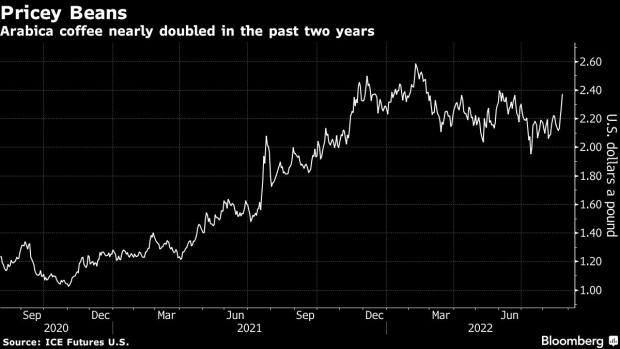Aug 30, 2022
Peso Crisis Imperils Coffee Supplies in Famed Cafes of Argentina
, Bloomberg News

(Bloomberg) -- An escalating currency crisis is threatening a touchstone of Buenos Aires life: coffee.
Argentina is tightening restrictions on imports to shield its precarious reserves of dollars as it tries to stave off a devaluation that’d bring even more turmoil to an economy featuring 71% inflation. Almost no industry is unscathed -- even importers of coffee sipped for generations in the capital’s famed cafes are feeling the pinch. Drinkers may be next.
“These restrictions mean we’re operating with minimal stocks,” said Martin Cabrales, vice president of Cabrales SA, a top supplier of beans to Argentine coffee houses. “It’s a difficult time, but we’re working with production officials and the central bank to try to meet demand.”
Read More: Argentina import blacklist features yachts, whiskey, bull semen
Argentines consume 1.7 pounds (0.8 kilo) of coffee a year on average, far from the volumes gulped down in parts of Europe since there’s competition from the local mate tea that’s drunk with a gourd and metal straw. But coffee is still one of Argentina’s great urban traditions, sipped in century-old cafes and bars in Buenos Aires, often with sweet croissants or, increasingly, in trendier spots that embrace modern global coffee culture.
Argentina imports all of its beans, mostly from neighboring Brazil. With the peso losing 13% in the past three months, the worst performance among emerging currencies, en route to a 26% loss this year, every dollar at the central bank counts. That means coffee, despite being a staple, doesn’t catch a break.
Bean imports stood at $75 million this year through July, up from $66 million for the whole of 2021, according to the national statistics agency. High prices spurred by tight global supplies aren’t helping the equation.
Read more: Brazil, the world’s top coffee provider, sees production shrink
The squeeze isn’t limited to coffee houses. Cafe Martinez, one of Argentina’s top coffee store chains, is battling to secure affordable supplies of packaged coffee to supermarkets.
“If we don’t get all of the necessary volume at a competitive price, both availability and pricing will be impacted,” said Cristian Lema, managing director of Cafe Martinez.
At Tres, one of the trendy cafes in Buenos Aires’s Colegiales neighborhood, owner Agustina Roman has already halved purchases as suppliers deliver fewer bags because of the restrictions. “Coffee will become a scarce commodity and for this reason its price will be even more speculative,” she said.
©2022 Bloomberg L.P.





